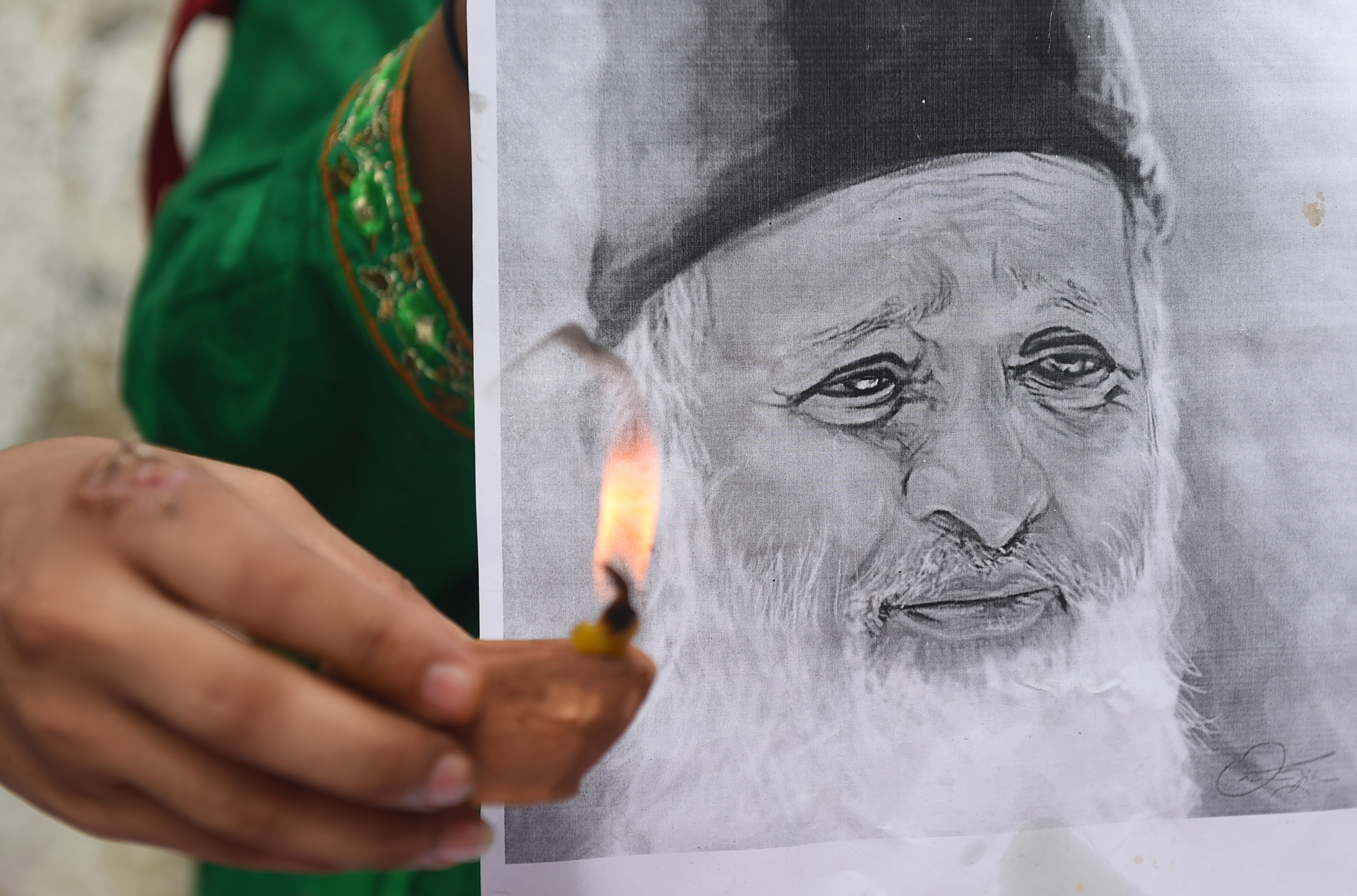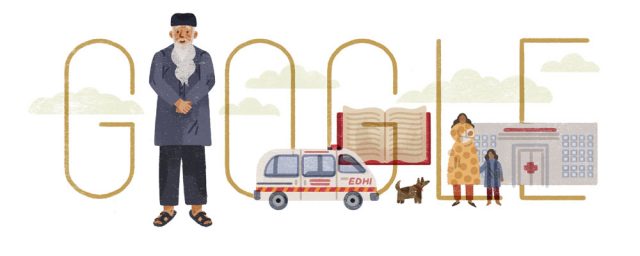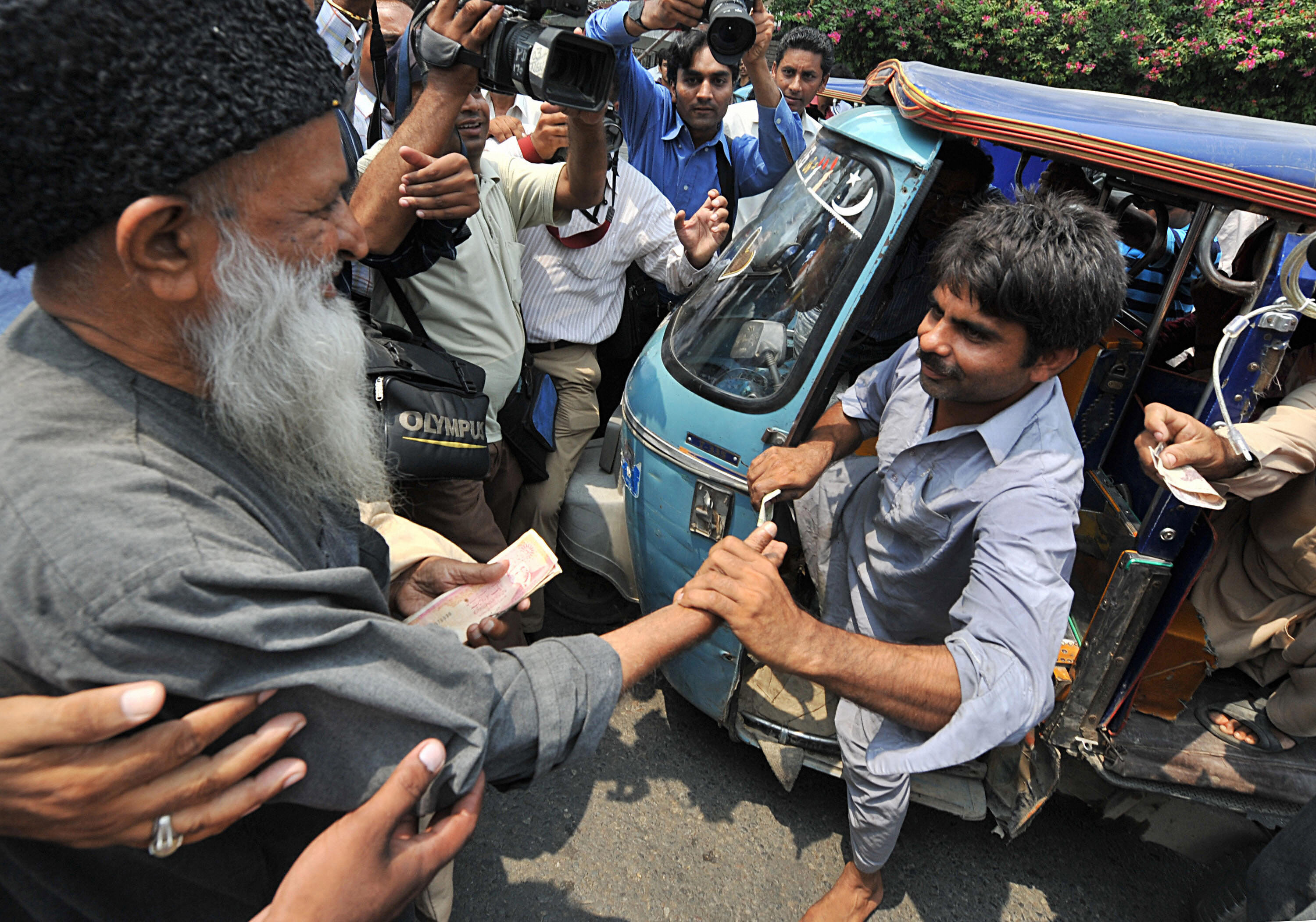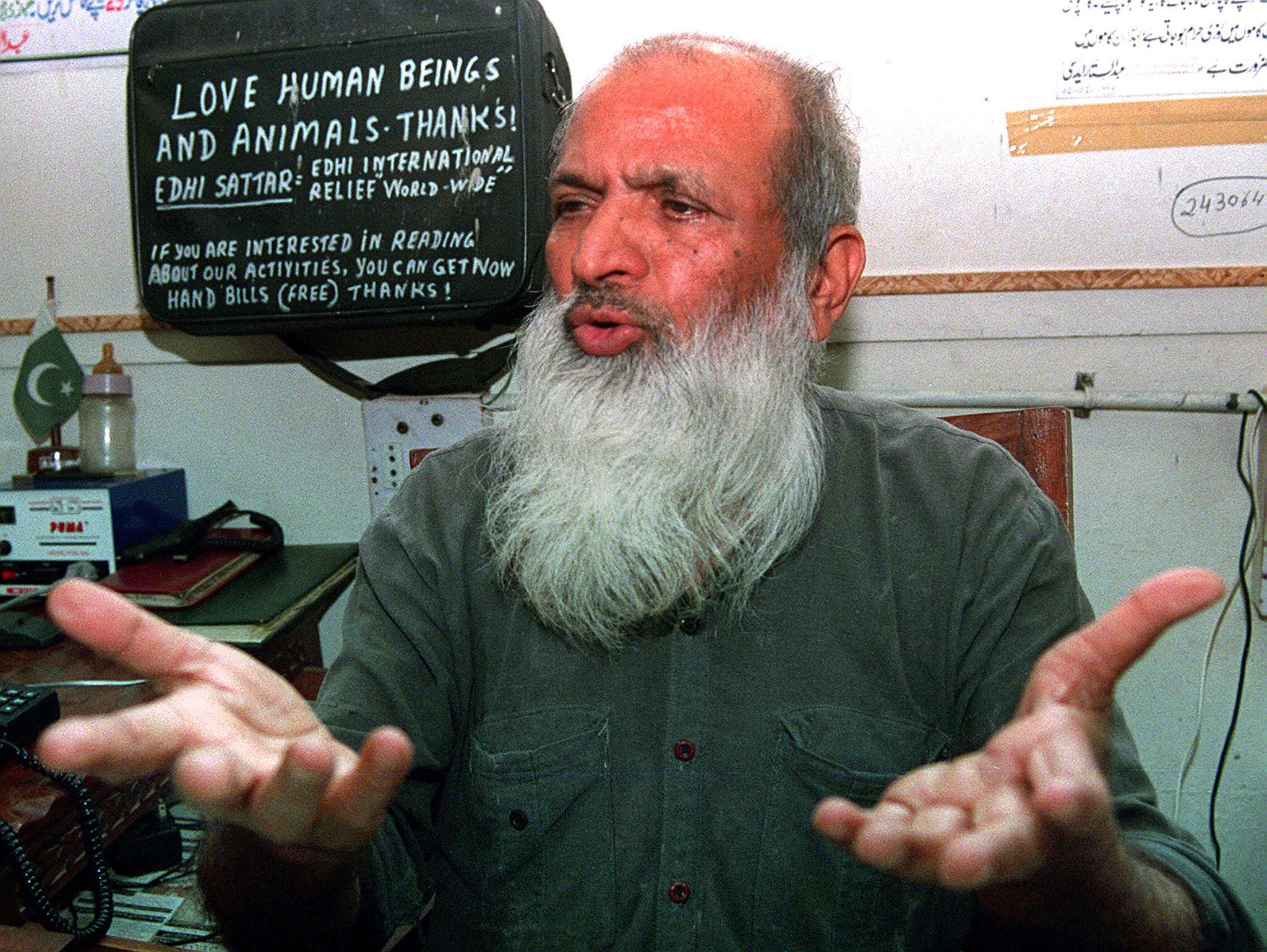
A Pakistani woman holds an oil lamp during a candlelight vigil for Edhi in Karachi on July 12, 2016.
(Getty)
On February 28, Google has chosen to honor Pakistan’s “Angel of Mercy,” Abdul Sattar Edhi. He was born in India in 1928 but relocated to Pakistan’s capital city, Kirachi, in 1947. This came as Pakistan was declared independent of the United Kingdom. After his mother’s death when Edhi was 19, he opted to dedicate his life to helping others.
According to Google’s blog, February 28 would have been Edhi’s 89th birthday. Although Edhi had said that he was never sure of his exact birthday.
By the time of he passed away from kidney failure in July 2016, Edhi was known as one of the most respected humanitarian figures in the world. He had adopted thousands of children throughout his lifetime and ran the Edhi Foundation along with his wife, Bilquis Edhi. The foundation set up orphanages across Pakistan. They also had centers that catered to drug rehabilitation and shelters for abandoned women.
Here’s what you need to know:
1. In 2005, His Foundation Donated $100,000 to the Victims of Hurricane Katrina

(Google)
In their obituary of Edhi in July 2016, the Guardian reported that the Edhi Foundation donated $100,000 to the victims of Hurricane Katrina.
The donation was first mentioned publicly by the U.S. Ambassador to Pakistan David Hale in a statement regarding the passing of Edhi. According to Pakistan Today, Hale said, “We join the people of Pakistan and the Edhi family in mourning the passing of this great man.” Hale added, “[Edhi’s] compassion for humanity was reflected in every aspect of his life.”
Other international efforts for the foundation included becoming involved in the fight against famine in Ethiopia in the 1980s.
2. Edhi Said in 2009 That He Had ‘Never Been a Religious Person’
During a 2005 interview with IRIN, Edhi said, “I do this work for the common people and part of that work is creating a general awareness of such problems as they exist because my work is beyond class, religion and creed.”
In the same piece, Edhi was asked about the most pressing problems in Pakistan. He responded:
The basic problem affecting the country today is human rights. Islamic fundamentalists have no roots among the common people and while they are pushing hard for religious fundamentalists to take hold, the common people still seek change through humanitarian and common human rights law.
This is a big problem in this country. The common people don’t believe this kind of religion because first and foremost they want to solve their basic problems, including human rights and economic.
While in a 2015 feature in the Guardian, Edhi’s wife, Bilquis Edhi, said, “There is more hostility towards us from the religious and political groups.” While Edhi stated that he had “never been a religious person.”
3. Despite His Celebrity, Edhi Lived With His Wife in a 2-Room Apartment in One of Their Orphanages
The BBC featured Edhi in a September 2014 documentary. It mentions that despite being among the most famous people in Pakistan, Edhi lived humbly with his wife in a two-room apartment that was attached to one of their orphanages. The couple had two daughters and two sons.
A 2010 Associated Press piece on Edhi reported that above his bedroom was a maternity ward and an orphanage where 18 children lived. The same article says that countless babies are left on the foundation’s doorstep and that “[Edhi’s] bed is a one-inch thick mattress on a piece of wood.”

Edhi pictured in 2008. (Getty)
An April 2008 Daily Telegraph feature on Edhi reported that he once went on a “long overland” journey in an ambulance. He forbade his wife from bringing extra clothes as his plan involved filling the vehicle with as many medical supplies as possible.
During his lifetime, Edhi was nominated for the Nobel Peace Prize on multiple occasions but never won. A 2014 Guardian feature notes that “Many Pakistanis say [Edhi] had a stronger claim to win the Nobel peace prize than Malala Yousafzai, the 17-year-old education activist who won the award this month.”
Edhi’s work and foundation was featured in the 2013 documentary film These Birds Walk. One of the director’s Omar Mullick told the Huffington Post about encountering people who were not fans of Edhi:
I sat around some people who were actually quite critical of Edhi and quite critical of the work he had done. They had thrown into question the transparency of this and said, ‘Look, why isn’t the institution run like this?’ I was hit so hard by how wrong that [perception is].
In fact, the way that Edhi and his foundation has autonomy, and can do what he wants, is actually the best way that these people are getting help. Asad [the ambulance driver] can actually go in there and get his hands dirty in the situation and say [to parents], ‘Hey, you’re taking advantage’ or ‘If you don’t want the kid, bring him back’ and [to the kids], ‘If the parents are bad to you, well, then they don’t have to pick you up.’ These are things that aren’t in any protocol.
And thank God they’re not. It allows the Edhi Foundation to adapt, which is what I think Pakistan demands.
4. Edhi’s Quotes Are the Most Inspirational Thing You Will Read Today
After Edhi’s death, some of his most inspirational quotes were collated by the Pakistani Express Tribune. Here are some of the most touching:
Chasing after desires creates inner turmoil. When the devil becomes guide, dacoits and gangsters are manufactured. He makes men fight against their souls to survive expensive items and most lose everything in the face of his strength. The internal enemy can only be overcome by a personal revolution.
My religion is humanitarianism, which is the basis of every religion in the world.
Empty words and long praises do not impress God. Show Him your faith by your deeds.
The Holy Book should open in your souls, not on your laps. Open your heart and see God’s people. In their plight you will find Him.
Appearance is a distraction, surrendering it develops truth and humility in abundance.
5. In 2014, Edhi Was Left Devastated When Nearly $500,000 Was Stolen From His Offices

Edhi pictured in 1999. (Getty)
The Guardian reported in October 2014 that Edhi’s apartment was broken into by armed robbers. The thieves stole money and gold totally nearly $500,000 in value.
Edhi’s grandson, Ahmed, told the Guardian, “It is the first time anything like this has happened. They came, held the staff hostage and put a pistol on [Edhi] so that he would give the keys.” The piece notes that Edhi’s foundation performed a storage facility to locals, hence the accumulation of cash and gold.
While speaking to the BBC, Edhi said, “I am heartbroken. After everything I have done, I never thought I’d be violated like this inside my own home.”
A follow-up piece in the Guardian in April 2015 read, “The theft was a shocking moment for an organization that is facing growing competition from Pakistan’s militant, religious right.”